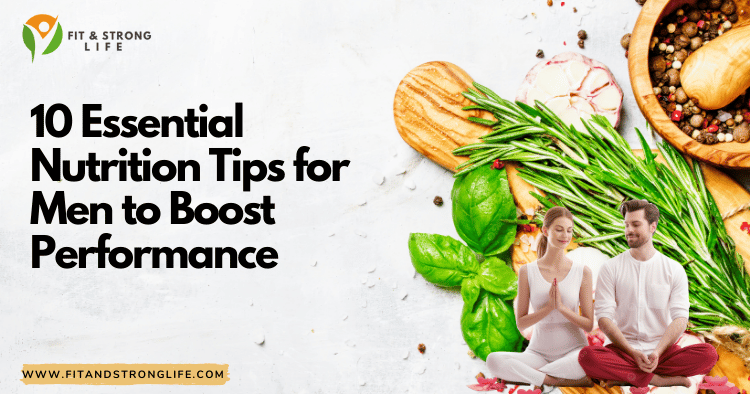Table of Contents
Understanding Men’s Nutritional Needs
Men typically have different nutritional requirements compared to women due to variations in body composition, metabolic rate, and hormonal levels. A well-rounded diet can help improve energy levels, build muscle, and support overall health. According to the Academy of Nutrition and Dietetics, men generally require more calories, protein, and certain vitamins and minerals. Understanding these needs is the first step in optimizing your nutrition for peak performance.
“Nutrition is the foundation of performance. Understanding your unique needs is the first step toward achieving your fitness goals.”
Prioritize Protein Intake
Protein is crucial for muscle repair and growth, especially for active men. Aim for at least 0.8 grams of protein per kilogram of body weight. According to a study published in the American Journal of Clinical Nutrition, higher protein intake can help in building lean muscle mass and enhancing recovery.
Protein Sources:
- Lean meats (chicken, turkey)
- Fish (salmon, tuna)
- Legumes (lentils, chickpeas)
- Dairy products (Greek yogurt, cottage cheese)
- Plant-based options (quinoa, nuts)
Incorporating a variety of protein sources ensures you get a full spectrum of amino acids, which are essential for muscle function and recovery. For more insights on protein, check out our article on Top 10 Protein Sources to Fuel Your Fitness Journey.
“Variety is key! Different protein sources provide different amino acids, which are essential for optimal muscle recovery.”
Embrace Healthy Fats
Fats are not the enemy; in fact, they play a vital role in hormone production, including testosterone, which is crucial for muscle growth and overall fitness. Aim for about 20-35% of your daily caloric intake from healthy fats.
Healthy Fat Sources:
- Avocado
- Nuts and seeds
- Olive oil
- Fatty fish (rich in omega-3s)
Healthy Fats vs. Unhealthy Fats
| Type of Fat | Sources | Health Benefits |
|---|---|---|
| Healthy Fats | Avocado, nuts, olive oil | Reduce inflammation, support heart health |
| Unhealthy Fats | Fried foods, trans fats | Increase risk of heart disease |
Incorporating healthy fats can improve your cardiovascular health and keep you feeling full longer. For more information on healthy fats, see our article on Top 5 Healthy Fats to Boost Your Fitness Journey.
“Healthy fats are essential for hormone production and can help you feel fuller for longer. Don’t shy away from them!”
Choose Whole Grains
Whole grains are an excellent source of complex carbohydrates, providing sustained energy essential for performance. They are rich in fiber, which aids digestion and helps maintain a healthy weight.
Whole Grain Options:
- Brown rice
- Oats
- Quinoa
- Whole grain bread
Switching from refined grains to whole grains can improve your energy levels and overall health. A study by Harvard found that whole grains can lower the risk of heart disease and diabetes.
“Whole grains are your allies in maintaining energy levels throughout the day. They provide lasting fuel for your workouts and daily activities.”
Stay Hydrated
Hydration is often overlooked, yet it’s crucial for optimal performance. Dehydration can lead to fatigue, decreased endurance, and impaired cognitive function. Men should aim for at least 3.7 liters (125 ounces) of fluids daily, depending on activity levels.
Hydration Tips:
- Drink water before, during, and after workouts.
- Include hydrating foods like fruits and vegetables.
- Monitor the color of your urine; aim for light yellow.
For more on hydration, check out our article on 10 Hydration Strategies to Boost Fitness Performance.
“Stay ahead of the game—proper hydration can mean the difference between a good workout and a great one!”
Micronutrients Matter
Vitamins and minerals play critical roles in energy production, immune function, and muscle contraction. Men often overlook the importance of micronutrients, but they are essential for overall performance.
Key Micronutrients for Men:
- Vitamin D: Supports bone health and immune function. Sources include sunlight, fortified foods, and fatty fish.
- Magnesium: Important for muscle function and energy production. Found in nuts, seeds, and leafy greens.
- Zinc: Vital for testosterone production and immune response. Sources include meat, shellfish, and legumes.
Consider a multivitamin if you struggle to get these nutrients from your diet, but always consult with a healthcare provider first. For a deeper dive into essential vitamins and minerals, take a look at our article on Top 10 Essential Vitamins and Minerals for Fitness Gains.
“Micronutrients are the unsung heroes of nutrition—small in quantity but mighty in their impact on performance and health!”
Plan Your Meals
Meal planning can help you stay on track with your nutritional goals. Preparing meals in advance makes it easier to choose healthy options and avoid last-minute unhealthy choices.
Meal Planning Tips:
- Set aside time each week to plan and prep meals.
- Include a variety of food groups to ensure balanced nutrition.
- Use portion control to avoid overeating.
Tools like meal prep containers and apps can help simplify the process. For additional tips, check out our guide on 10 Essential Meal Prep Tips for Fitness Success.
“Meal planning is your roadmap to success—take the time to prepare, and you’ll reap the rewards!”
Timing is Key
Nutrient timing can influence performance, especially when it comes to workouts. Consuming the right nutrients before and after exercise can enhance recovery and muscle growth.
Pre-Workout Nutrition:
- Eat a balanced meal with carbs and protein 2-3 hours before exercise.
- A small snack like a banana or a protein bar can be consumed 30 minutes prior.
Post-Workout Nutrition:
- Aim for a combination of protein and carbohydrates within 30 minutes after exercising to replenish glycogen stores and aid recovery.
For additional insights, check out Top 7 Pre-Workout Foods for Optimal Performance and Top 7 Post-Workout Nutrition Tips for Optimal Recovery.
“Think of your body like a car—fuel it properly before and after workouts to keep it running at peak performance!”
Limit Processed Foods
Processed foods are often high in sugar, unhealthy fats, and sodium, which can undermine your nutritional efforts. Reducing these foods from your diet can improve overall health and performance.
Tips to Limit Processed Foods:
- Cook meals from scratch as often as possible.
- Read labels and choose products with fewer ingredients.
- Opt for whole, unprocessed snacks like fruits, nuts, or yogurt.
“Cutting back on processed foods can be a game-changer for your health—choose whole, unprocessed options for optimal nutrition.”
Listen to Your Body
Finally, the most important tip is to listen to your body. Everyone’s nutritional needs are different, and what works for one person may not work for another. Pay attention to how your body responds to different foods and adjust accordingly.
Signs Your Nutrition Needs Adjusting:
- Fatigue or low energy levels
- Unexplained weight gain or loss
- Digestive issues
Don’t hesitate to consult with a registered dietitian or nutritionist for personalized advice.
“Your body knows best—tuning in to its signals can guide you toward the nutrition that works for you!”
By following these essential nutrition tips




